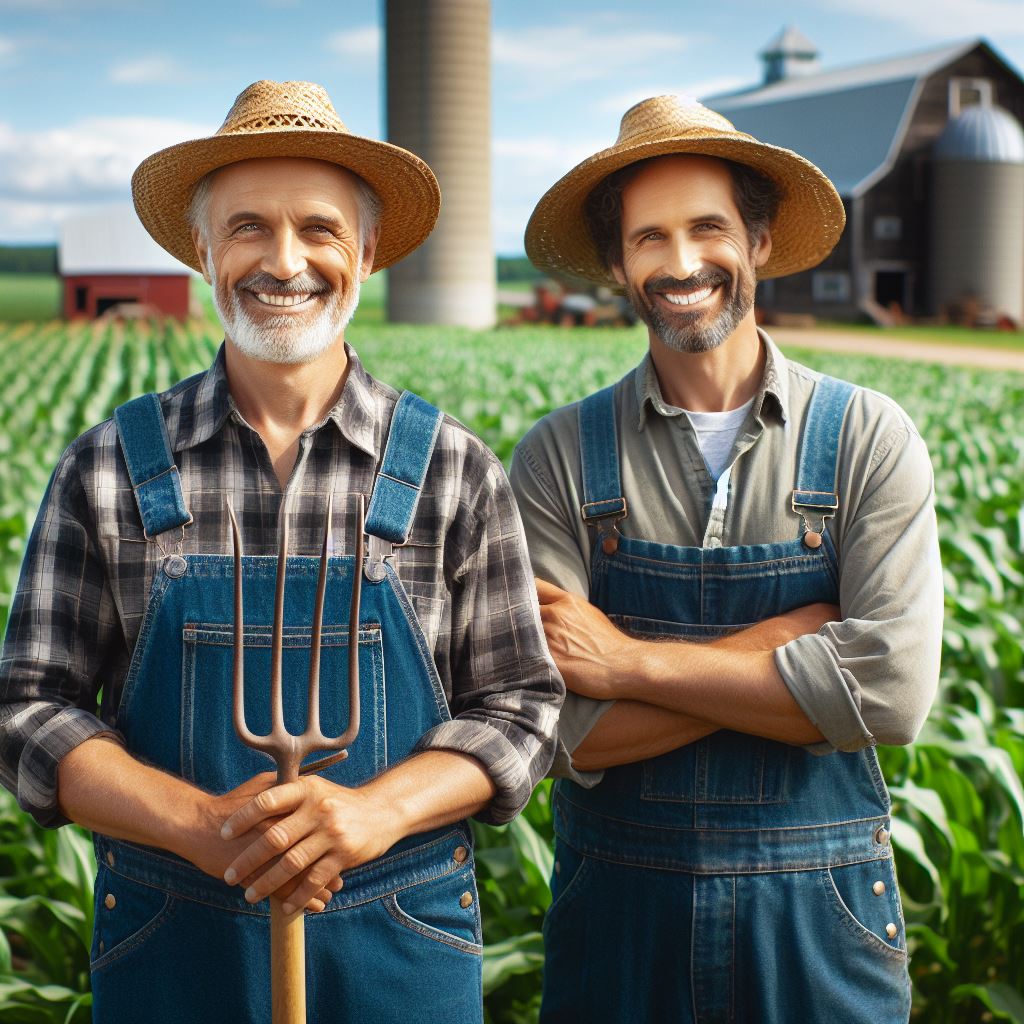Growing Local: Bob’s Community Impact
Last Updated on February 18, 2024
Introduction
Meet Bob, a dedicated individual in our community who plays a crucial role in making it thrive. Bob is not just an ordinary member of our society; he is a farmer, and a champion of local farming.
Local farming holds immense importance for our community. It not only provides us with fresh and nutritious food but also has a significant impact on our overall well-being.
When we support local farming, we are supporting our economy and promoting sustainability.
Bob understands this significance and has made it his mission to create a positive impact through his farming practices.
By growing food locally, Bob ensures that we have access to healthy produce that is free from harmful chemicals and genetically modified organisms.
Moreover, Bob’s commitment to the community goes beyond just providing us with food. He actively engages in activities that promote awareness of the benefits of local farming.
Bob often hosts workshops and educational sessions, encouraging people to grow their food and adopt sustainable agricultural practices.
By doing so, Bob not only empowers individuals to take control of their nutrition but also strengthens the bonds within our community.
Bob’s efforts have brought us closer together, as we share knowledge, tips, and support when it comes to gardening and farming.
Bob’s community impact is undeniable. He has made a significant difference in promoting self-sustainability and fostering a sense of community spirit.
His dedication to local farming has not only improved our quality of life but also created a ripple effect in our economic and environmental well-being.
Bob’s Background
Background information about Bob’s experience in farming
Bob Smith, a fifth-generation farmer, has been immersed in the world of agriculture since his childhood. Growing up on his family’s farm, Bob developed a deep love for the land and a keen interest in growing local produce.
His passion for growing local produce
- His passion for sustainable farming practices led him to pursue a degree in agriculture at the prestigious Greenfield University.
- During his studies, Bob actively participated in various farming programs, honing his skills in organic farming techniques.
- After completing his education, Bob worked on several farms, gaining valuable hands-on experience in different aspects of farming.
- Bob’s extensive background in farming, coupled with his passion for local produce, inspired him to make a difference in his community.
- Witnessing the decline of local farming and the prevalence of imported produce, Bob felt compelled to take action.
- He saw an opportunity to provide his community with fresh, nutritious, and organic fruits and vegetables.
His motivations for starting a farming business in the community
- Bob’s deep-rooted connection to the land and his desire to promote healthy eating habits fueled his motivation to start his own farming business.
- He envisioned establishing a farm that would not only supply local produce but also educate the community about the importance of eating locally.
- Bob believed that by growing and consuming local produce, the community would not only improve its health but also support sustainable agriculture.
- With his vision in mind, Bob leaped and founded “Bob’s Organic Farms” in the heart of the community.
- Starting small, Bob leased a piece of land and began cultivating a wide range of fruits, vegetables, and herbs.
- Using his knowledge of organic farming techniques, Bob ensured that his crops were pesticide-free and cultivated in an environmentally friendly manner.
- Bob’s commitment to quality and sustainability quickly gained recognition, and his produce became highly sought after within the community.
- Meeting demand, Bob expanded, leasing more land and hiring skilled agriculturalists.
- His passion for community engagement led to educational workshops, fostering a stronger connection between consumers and food.
- Collaborating with schools and healthcare, Bob introduced fresh produce into menus, promoting healthy eating.
- Word of his community-centric approach and produce quality propelled Bob’s farming business to flourish.
Today, Bob’s Organic Farms has become a thriving hub where the community gathers to buy fresh produce and learn about farming.
The impact of Bob’s farming business extends beyond the community’s access to local, sustainable produce.
By supporting local farmers and raising awareness about the benefits of eating locally, Bob has created a ripple effect that has revitalized the entire agricultural landscape.
Bob’s farming practices serve as a model for other farmers in the community, encouraging them to adopt sustainable methods.
Through his tireless efforts, Bob has not only grown his business but also elevated the health and well-being of his community.
Read: Future of Farming: Olivia’s Vision
Bob’s Farming Practices
Benefits of these practices for the community and the environment
Bob’s commitment to organic and sustainable farming methods is truly commendable.
He understands the importance of taking care of the environment and providing the community with healthy and nutritious produce.
Bob’s commitment to organic and sustainable farming methods
- One of the main benefits of Bob’s farming practices is the absence of harmful chemicals and pesticides.
- By using natural fertilizers and organic pest control methods, Bob ensures that his produce is free from any dangerous toxins.
- This not only benefits the health of individuals consuming his products but also protects the overall ecosystem.
Innovative techniques or technologies that Bob utilizes on his farm
Bob’s sustainable farming techniques:
- Preserve natural resources by avoiding soil degradation and erosion through methods like crop rotation.
- Maintain land fertility, ensuring high-quality crop production while minimizing water usage for environmental friendliness.
- Embrace innovation with precision agriculture, optimizing resource utilization through advanced GPS technology.
- Utilize vertical farming to maximize land efficiency and yield, ideal for limited urban spaces.
- Incorporate renewable energy sources like solar panels to power farm operations, reducing carbon footprint.
- Provide organic, locally grown produce, promoting community health and balanced diets.
- Create employment opportunities, benefiting the community’s economic well-being and individual livelihoods.
Overall, Bob’s passion for organic and sustainable farming methods is truly inspiring.
His commitment to environmentally friendly practices, coupled with his innovative techniques and technologies, sets an example for the farming community.
By prioritizing the well-being of the environment and the community, Bob is making a significant impact in his local area.
Read: CSA: Farming for the Future
Impact on Local Economy
In this section, we will explore how Bob’s farm contributes to the local economy, discussing the financial benefits for the community through job creation and increased revenue.
We will also highlight the ripple effect of supporting local businesses and the multiplier effect on the local economy.
Bob’s Farm: A Boost to the Local Economy
Bob’s farm plays a vital role in boosting the local economy by providing various economic benefits.
- Bob’s farm is a major employer in the area, providing numerous job opportunities for residents.
- The farm’s operations require a diverse workforce, spanning from agricultural laborers to skilled technicians.
- These job opportunities not only improve the livelihoods of individuals but also contribute to reducing unemployment rates in the community.
Financial Benefits for the Community
The financial benefits derived from Bob’s farm extend beyond job creation, resulting in increased revenue flowing into the local community.
- As the farm expands, it requires additional resources, machinery, and equipment, leading to substantial business transactions with local suppliers.
- These transactions stimulate economic activity, generating more income and tax revenues for the community.
- Moreover, the farm contributes to property taxes, supporting local public services such as schools, healthcare, and infrastructure development.
Ripple Effect of Supporting Local Businesses
The impact of Bob’s farm on the local economy extends beyond its direct financial contributions, creating a ripple effect that benefits other local businesses.
- As the farm thrives, it requires various goods and services, such as agricultural supplies, transportation, and packaging materials.
- Local businesses catering to these needs experience a surge in demand, leading to their own expansion and job creation.
- This symbiotic relationship between Bob’s farm and other local businesses further strengthens the overall economic fabric of the community.
Multiplier Effect on the Local Economy
Supporting local businesses, including Bob’s farm, brings about a multiplier effect that amplifies the impact on the local economy.
- When residents choose to buy locally grown produce from Bob’s farm, their spending creates a chain reaction.
- The income earned by the farm’s employees and local business owners then circulates within the community.
- This cycle fuels economic growth as the money is reinvested, creating additional jobs and fostering the development of new businesses.
In fact, Bob’s farm plays a crucial role in driving the local economy forward.
Through job creation, increased revenue, and support for local businesses, the farm creates a positive ripple effect that benefits the entire community.
By choosing to buy locally and supporting businesses like Bob’s farm, individuals can contribute to the sustainable growth and prosperity of their neighborhood.
Community Engagement and Education
Bob understands the importance of community engagement in fostering a vibrant local food ecosystem.
He goes beyond merely running a successful farm; he actively engages with the community to promote sustainable farming practices and establish a stronger connection between consumers and local food production.
Through various efforts and educational programs, Bob has made a significant impact on his community and the wider agriculture sector.
Engaging with the Community
Bob firmly believes in the power of community involvement and recognizes that sustainable farming practices can only thrive within a supportive network of individuals and organizations.
To this end, he actively seeks out opportunities to engage with the local community.
Bob frequently attends community events, such as farmers’ markets and food festivals, to showcase his farm’s produce and educate consumers on the benefits of supporting local food systems.
He also collaborates with local schools, inviting students to visit the farm and learn about sustainable farming firsthand.
By hosting farm tours and interactive workshops, Bob provides educational experiences that promote a deeper understanding of the environmental and social impact of agriculture.
These interactions not only nurture the younger generation’s appreciation for local food but also inspire future farmers and conservationists.
Additionally, Bob actively participates in community forums and engages in discussions on sustainable practices.
By sharing his knowledge and experience, he contributes to the collective learning process, empowering others to make informed decisions regarding food production and consumption.
Educational Programs and Workshops
Recognizing the need to equip people with the knowledge and skills necessary to practice sustainable farming, Bob organizes educational programs and workshops.
These initiatives cater to various age groups and backgrounds, ensuring that everyone can benefit from his expertise.
For children and young students, Bob offers hands-on workshops that cover topics such as composting, seed saving, and organic pest control.
Through engaging activities and demonstrations, he sparks curiosity and introduces sustainable farming practices in a fun and accessible manner.
These workshops have become highly regarded in the community, attracting participants from both urban and rural areas.
Bob also conducts workshops tailored to aspiring farmers and individuals interested in local food production.
These workshops delve deeper into sustainable farming techniques, covering topics such as permaculture, regenerative agriculture, and agroforestry.
By providing practical guidance and sharing his experiences, Bob empowers these individuals to embark on their own sustainable farming journeys.
Establishing a Stronger Connection
- Bob’s efforts in community engagement and education play a crucial role in establishing a stronger connection between consumers and local food production.
- Through his farm, people not only have access to fresh, nutritious produce, but they also become more aware of the processes involved in its production.
- By bridging this knowledge gap, Bob creates a sense of trust and transparency between producers and consumers.
- When individuals understand the effort and care that goes into sustainable farming, they are more likely to choose local and support local farmers.
- This, in turn, strengthens the local food economy, reduces food miles, and fosters a sense of community resilience.
- Moreover, Bob’s educational programs and workshops create a platform for dialogue and collaboration.
- As individuals come together to learn and share ideas, they become part of a larger movement focused on sustainable food systems.
- By facilitating this sense of community, Bob encourages collective action and generates momentum towards a more sustainable and resilient future.
Through his community engagement efforts and educational programs, Bob goes above and beyond in promoting sustainable farming practices and enhancing the connection between consumers and local food production.
His commitment to educating others and fostering a sense of community not only benefits his farm but also contributes to the overall resilience and sustainability of the local food ecosystem.
Bob’s impact reaches far beyond his immediate community, inspiring others to follow in his footsteps and contribute to the future of sustainable agriculture.
Read: Community Gardens: Farm-to-Table Heroes

Fresh and Healthy Food Accessibility
Bob’s farm plays a pivotal role in addressing food accessibility challenges within his community.
By providing locally grown produce, Bob ensures that fresh and healthy options are readily available to everyone, regardless of their socioeconomic background.
Tackling Food Accessibility Challenges
Bob understands the importance of combating food deserts and ensuring that all community members have access to nutritious food.
His farm is strategically located in an underserved area, making it easier for residents to access fresh produce.
Partnerships or initiatives Bob participates in to make fresh produce more accessible to underserved areas
Bob actively participates in various partnerships and initiatives aimed at increasing accessibility to fresh produce.
He collaborates with local grocery stores to stock their shelves with his farm’s fruits and vegetables, bringing healthier options to underserved areas.
Another initiative Bob is involved in is the establishment of a mobile farmers market.
This innovative concept brings fresh food directly to underprivileged neighborhoods, eliminating transportation barriers that often hinder access to healthy groceries.
Bob’s farm also operates a Community-Supported Agriculture program, allowing residents to purchase shares of his seasonal harvest.
This not only provides them with a continuous supply of locally grown produce but also supports the sustainability of Bob’s farm.
Health benefits of having access to locally grown, fresh food
Access to locally grown, fresh food offers numerous health benefits to the community.
- Firstly, it ensures that individuals have access to food with higher nutritional value, as locally grown produce is often picked at its peak ripeness and contains more essential vitamins and minerals.
- Furthermore, by consuming locally grown food, residents minimize their exposure to harmful chemicals present in conventionally grown produce.
- Bob’s farm follows organic farming practices, ensuring that the food produced is free from pesticides and other harmful substances.
- Not only does Bob’s farm provide health benefits, but it also has a positive environmental impact.
- Locally grown food reduces the carbon footprint associated with transportation, as it doesn’t need to travel long distances to reach the consumer.
- This promotes sustainability and supports the local ecosystem.
- Having access to locally grown food fosters a stronger connection between residents and their community.
- It boosts the local economy, supports small-scale farmers like Bob, and encourages community members to take an active interest in food production and sustainability.
In essence, Bob’s farm is a crucial player in addressing food accessibility challenges within his community.
Through strategic location, partnerships with local stores, and innovative initiatives like the mobile farmers market and CSA program, Bob ensures that fresh and healthy produce is accessible to all.
The health benefits and environmental impact of locally grown food further contribute to the overall well-being of the community.
Environmental Impact
Positive environmental impact of Bob’s farming practices
Bob’s farming practices have had a significant positive impact on the environment in his community.
How he aims to reduce carbon emissions, conserve water resources, and promote biodiversity
- Reducing Carbon Emissions: He is actively working towards reducing carbon emissions by implementing sustainable farming methods such as crop rotation and using organic fertilizers.
- Conserving Water Resources: Bob understands the importance of conserving water resources and has implemented innovative irrigation systems that minimize water usage.
- Promoting Biodiversity: Bob prioritizes biodiversity, dedicating land to native wildlife habitats and plants, a key aspect of his farming practices.
- Long-Term Benefits for the Environment: Bob’s farming brings lasting benefits: less carbon, water saved, and increased biodiversity for sustainability.
Long-term benefits for the environment and the local ecosystem
Bob’s farming practices directly benefit the local ecosystem by:
- Increasing biodiversity, attracting beneficial insects and birds for natural pest control.
- Improving soil health with organic fertilizers and crop rotation, enhancing water absorption and nutrient retention.
- Reducing harmful chemical usage, ensuring safer produce, and environmental preservation.
- Implementing water conservation methods like drip irrigation and rainwater harvesting, replenishing groundwater levels.
- Preserving wildlife habitats, maintaining ecosystem balance, and preventing biodiversity loss.
- Aiding carbon sequestration, with healthy soil acting as a carbon sink, combating climate change.
- Improving air quality through reduced chemical usage and enhanced soil health.
- Educating the community on sustainable farming, fostering awareness and participation.
- Enhancing resilience to climate change through diverse crop rotation and soil improvements.
- Reducing the ecological footprint, benefiting the community and future generations.
In short, Bob’s farming practices have a wide range of positive environmental impacts.
From reducing carbon emissions and conserving water resources to promoting biodiversity and improving soil health, Bob’s dedication to sustainability sets an inspiring example for the entire community.
The long-term benefits for the environment and the local ecosystem make his efforts even more significant in creating a more sustainable future.
Read: Explore Farm-to-Table: Local Seminars
Conclusion
In this blog post, we explored the community impact of Bob, a local farmer, and his dedication to sustainable farming practices.
We discussed various key points, emphasizing the importance of supporting local farmers like Bob.
By choosing to buy locally grown produce, we not only contribute to our community’s economic growth but also help reduce our carbon footprint.
Bob’s commitment to organic and sustainable farming methods benefits both our health and the environment.
Supporting local farmers like Bob means investing in the local economy, preserving farmland, and promoting a sense of community.
By choosing to eat locally grown food, we support sustainable agriculture and reduce the dependence on long-distance transportation, which further helps reduce greenhouse gas emissions.
Every individual needs to consider the impact of their food choices on the community and the environment.
By making conscious decisions, we can create a positive ripple effect, inspiring others to follow suit. Supporting local farmers and choosing locally grown produce is a small but powerful step towards a sustainable future.
Let us pledge to support local farmers like Bob, appreciate their hard work, and acknowledge the crucial role they play in building a resilient and sustainable community.
Together, we can make a difference.


